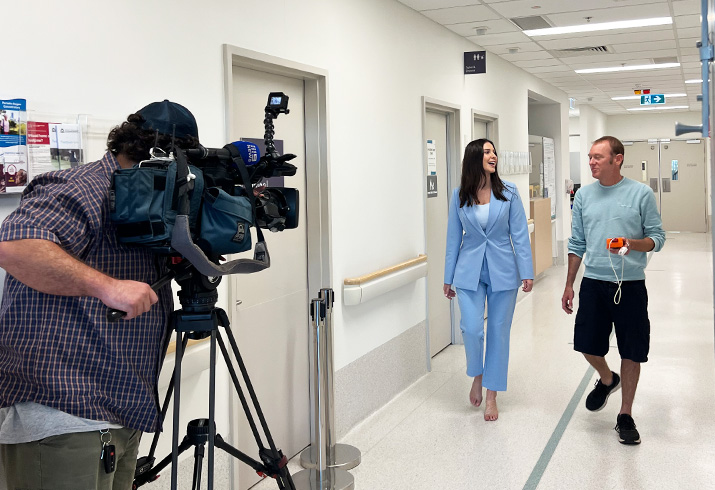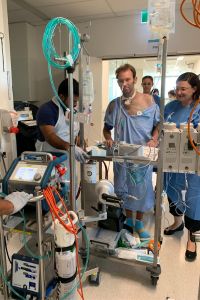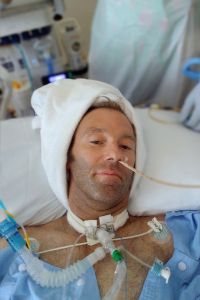FSH ICU uses specialised lung machine to get Dad moving before lifesaving transplant surgery

"It's like seeing old family."
Clinton Styler smiles as he spots the familiar faces in the crowd in what became his second home after spending three months in hospital.
The father of two recently reuniting with the teams of specialists involved in his care during his first visit back to the Fiona Stanley Hospital (FSH) Intensive Care Unit (ICU) since walking out with a new set of lungs.
Working as a FIFO electrician, Clinton first became unwell while on site late last year and was admitted to Rockingham General Hospital Emergency Department (ED) upon returning home.
What started as pneumonia, soon progressed and was destroying his lung tissue.
"I had two different strains of a mycoplasma bacterial infection and despite their best efforts with the ventilator and IV fluids, my lungs just weren't improving and I went downhill very quickly," Clinton said.
The decision was made to transfer Clinton to the FSH ED and place him into an induced coma.
"While I was under it was quite a harrowing experience for my wife Mandy and two daughters Adalyn and Elysia as I came very close to death - twice," he said.
The fit and healthy 44-year-old was now fighting for his life and needed a double lung transplant to survive.

"It was daunting to think I'd not only need a new set of lungs but that I would also need to be physically well enough to survive the transplant surgery," he said.
The decision was made to wake Clinton up from the induced coma and place him on ECMO.
Senior FSH Intensivist and ECMO Lead, Chris Allen, had just completed the international, multicentre ECMO-Rehab trial at FSH for patients receiving the highest level of life support with heart and lung failure.
"Co-led by myself and senior physiotherapist Lisa van der Lee, the trial investigated the effect on patient outcomes of early mobilisation for suitable patients on ECMO," Chris said.
"Clinton was reliant on the ECMO machine doing the work of his lungs to provide oxygen and remove carbon dioxide from his body, as a bridge to receiving a lung transplant.
"Rather than lying in bed unconscious for months and wasting muscle, Clinton was woken from sedation and commenced rehabilitation early until his new lungs arrived.
"Within four-weeks Clinton was able to sit on the edge of his bed, stand by Christmas, and walk in the New Year, all with full ECMO support."
Senior FSH ICU Physiotherapist, Lisa van der Lee, said walking patients on ECMO was a highly complex activity.
"We require at least one expert senior physiotherapist, an ECMO intensivist, a perfusionist and two senior ECMO nurses to ensure safety of the patient," Lisa said.

"While this activity is highly resource and skill intensive, the benefit for Clinton was worthwhile.
"This meant he was in a better physical condition to receive his lung transplant, subsequently optimising his post-transplant recovery and reducing time spent in hospital."
Prior to receiving his new lungs in mid-January, Clinton was walking 100 metres each day in the ICU whilst on ECMO support.
After hearing of Clinton's successful surgery and recovery, the Minister for Health; Mental Health, Hon Meredith Hammat, recently took the opportunity to meet with him, along with his extensive clinical team, and take a tour of the FSH ICU.
Daily life for Clinton now looks very different with regular visits to the lung transplant clinic and twice weekly physiotherapy sessions in the pulmonary rehabilitation gym at FSH.
"I'm starting to get fitter and gain weight again," he said.
"It really does take a village and looking back on the past six months, I couldn't have done it without the incredible support crew I had in hospital and at home.
"To still be here with Mandy and the girls - I feel like I'm one of the lucky ones."
Watch the Channel 9 news coverage below
Keep up to date with our news and achievements
Find out more on Facebook (external site) or LinkedIn (external site)

